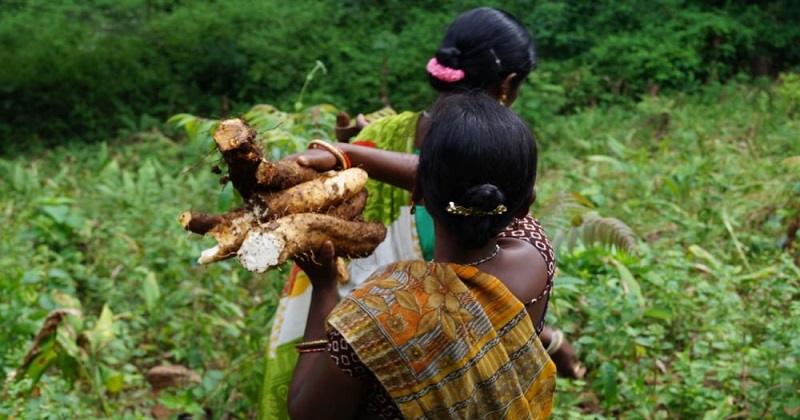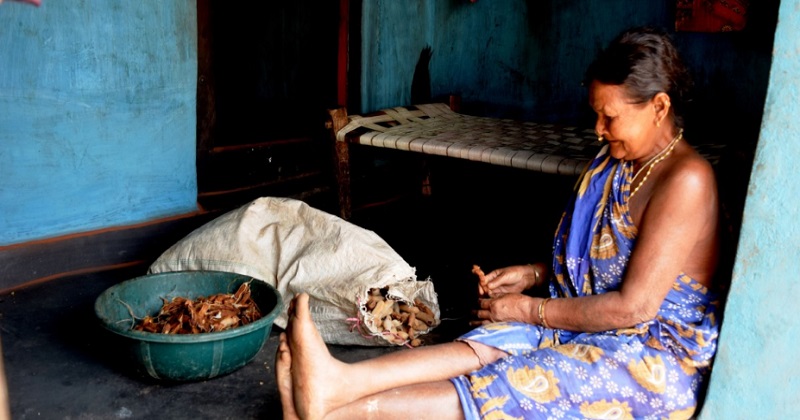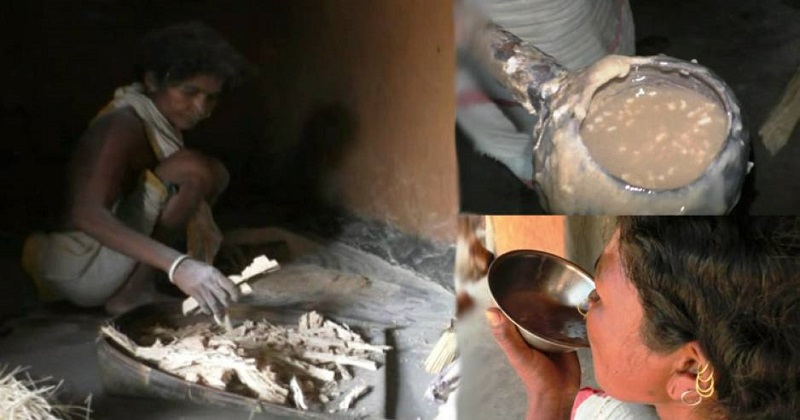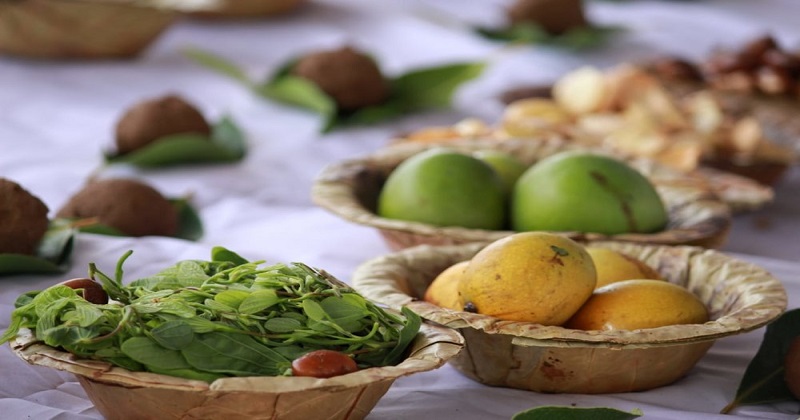
One of India’s most vulnerable tribes, the Dongria Kondhs of Odisha, has been living in the Niyamgiri foothills for centuries. The hill range stretching across the districts of Rayagada and Kalahandi is also considered as an important hotspot for biodiversity in the Eastern Ghats.
The region in the Dongria region has long been affected by the struggle of Dongria communities to protect Niyam Giri from the mine that was awarded to Vedanta Resources, an English company. Dongrias have vehemently resisted the proposal since Niyamgiri is their main source of livelihood. In response to the support and solidarity of community-based organizations, civil societies, and international agencies, the Supreme Court of India banned Vedanta’s mining project.

The indigenous tribes of Niyamgiri hills are now satiating their hunger during this Corona period with the gruel prepared with the stem of ‘Salap’ tree (Caryata urens). ‘Every woman wants to feed her family with nutritious food, but we have no choice but to eat what we have.’ – Kadraka Baimu, 35, a Dongria Kondh woman from the Niyamgiri hill. ‘We don’t know whether it will cause health problems. Our priority right now is to satisfy our hunger’.
In addition, she noted that there is no work available, the government distributes subsidized rice only once or twice a year, and even then we are unable to purchase it. ‘Do we have an alternative to eating this Salap gruel?’ She resides in Buduni village under the Parasail Panchayat of Kalayansinghpur block of Rayagada district.
On every morning, Baimu and her husband travel to the forest to collect the stems of the Salap tree. Her mother-in-law grinds the stems properly after she dries them. She then put the powdered stems in an earthen pot. Adding water, she lets it boil. Gruel thickens as it is cooked properly. The gruel is preserved for days together and eaten. Sometimes they put some veggies or leaves in it and sometimes they add millet and eat it. ‘We get 35 kg rice under the Antoday Yojana, but for those who live with five or six family members, it doesn’t last for months. In the middle of the month, when the rice runs out, this gruel is the only hope to feed the family,’ Sikoka Pramoda of Niyamgiri hill explained.

‘Under Covid-19-driven lockdown, we couldn’t sell our forest-produced items like pineapples and mangoes. Consequently, no tribe owns a penny. At 35 rupees, how will we buy rice?’ Sikoka questioned. Many Dongrias, such as Baimu and Pramod, have been struggling to feed their families. Gruel of the Salap stems are inedible foods that may cause stomach disorders and diarrhoea. Dr. Saumya Ranjan Jena, Community health center, Kalyansingpur, warned the Dongrias not to take this food as a staple diet.
Dongria is one of the primitive tribes (particularly vulnerable tribal group) in Odisha. Their estimated population is about 10,000 people, who live in 120 settlements up to 5,000 feet above sea level. The Dongrias live in scattered villages throughout the hills. The tribe believes they were granted the land of Niyamgiri by Niyam Raja, and that they are his descendants. Their villages are located on hill slopes and in valleys. Dongria Kondh’s economy and livelihood are dependent on the collection of NTFP and Podu cultivation (A form of shifting cultivation), which they carry out by clearing the forest and burning it every year, then cultivating crops on the slope.

“These days, we are unable to cultivate since the forest department prohibits us from clearing a forest patch. We only depend on minor forest products, horticulture, and the wages provided by the government rarely. The lockdown prevented us from going to the market. Since this is the mango season, we could have earned some money, but we are left with nothing. How will we feed our children?” Lachi Sikoka, another Dongria woman asked.
It was in 1964 that the Dongria Kondh Development Agency (DKDA) was established to implement developmental initiatives in Niyamgiri aimed at improving the lives and conditions of the People of Dongria, and bringing them into the mainstream of society. A program called Odisha PVTG Empowerment and Livelihoods Improvement Program (OPELIP) is also in place to improve the lives of the Dongria tribe. However, the tribe is still forced to eat Salap Gruel. ‘Sometimes they provide some work, but most of the time we are idle with no work. They receive crores of rupees funds in our name but see how we live. Our people do not even get two square meals a day,’ Sikoka Pramod claimed.
Read more: International Yoga Day: India Post issues special cancellation stamp
Upon asking the local block development officer why entitlements are not reaching the end beneficiaries, Kalu Charan Nayak, BDO, Kalyansinghpur block replied, ‘They should not eat that Salap stem gruel since it is inedible food. Whatever entitlements the block office is supposed to provide them are being sent on time. We will definitely look into the matter and ensure that they do not eat inedible food like this under the Odisha PVTG Empowerment and livelihoods improvement program’.
During 2001, the Rayagada district made headlines when 21 tribal members allegedly died of starvation after eating mango kernel gruel and wild roots that turned poisonous and killed them. After two decades, the tribal group of Rayagada district are consuming gruel from the stems of the Salap, which is unfortunate but is raising questions about the effective implementation of government programs meant for the Dongrias.

Post Your Comments